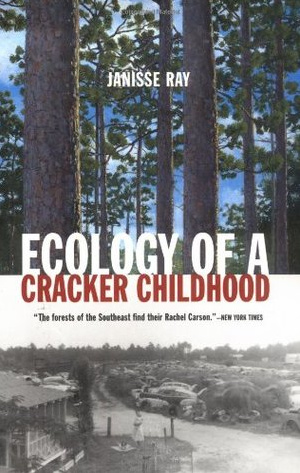

Janisse Ray · 224 pages
Rating: (1.7K votes)
“I carry the landscape inside me like an ache. The story of who I am cannot be severed from the story of the flatwoods.”
― Janisse Ray, quote from Ecology of a Cracker Childhood
“Turning back to embrace the past has been a long, slow lesson not only in self-esteem, but in patriotism—pride in homeland, heritage. It has taken a decade to whip the shame, to mispronounce words and shun grammar when mispronunciation and misspeaking are part of my dialect, to own the bad blood. What I come from has made me who I am.”
― Janisse Ray, quote from Ecology of a Cracker Childhood
“I think of my own life, how it embraces a great quest to know every cog of nature--the names of oaks and ferns, the secret lives of birds, the taste of venison and Ogeechee lime, wax myrtle's smell and rattlesnake's, the contour of bobcat tracks, the number of barred owl cackles, the feel of Okefenokee Swamp water on my skin under a blistering sun.
I search for a vital knowledge of the land that my father could not teach me, as he was not taught, and guidance to know and honor it, as he was not guided, as if this will shield me from the errancies of the mind, or bring me back from that dark territory should I happen to wander there. I search as if there were peace to be found.”
― Janisse Ray, quote from Ecology of a Cracker Childhood
“My homeland is about as ugly as a place gets. There's nothing in south Georgia, people will tell you, except straight, lonely roads, one-horse towns, sprawling farms, and tracts of planted pines. It’s flat, monotonous, used-up, hotter than hell in summer and cold enough in winter that orange trees won’t grow. No mountains, no canyons, no rocky streams, no waterfalls. The rivers are muddy, wide and flat, like somebody’s feet. The coastal plain lacks the stark grace of the desert or the umber panache of the pampas”
― Janisse Ray, quote from Ecology of a Cracker Childhood
“The moral of the story, Son," Pun would say, "is Don't take more on your heart than you can shake off on your heels."
Of all lessons, that one I never learned and I hope I never do. My heart daily grows new foliage, always adding people, picking up new heartaches like a wool coat collects cockleburs and beggar's-lice seeds. It gets fuller and fuller as I walk slow as a sloth, carrying all the pain Pun and Frank and so many others tried to walk from. Especially the pain of the lost forest. Sometimes there is no leaving, no looking westward for another promised land. We have to nail our shoes to the kitchen floor and unload the burden of our heart. We have to set to the task of repairing the damage done by and to us.”
― Janisse Ray, quote from Ecology of a Cracker Childhood

“were uproariously demanding relief from their intolerable miseries — in this Potemkin sideshow there prevailed a preposterous and mendacious comfort.”
― Stefan Zweig, quote from Marie Antoinette: The Portrait of an Average Woman
“Your wife is psychotic."
"Michaela is just angry. Anger does fascinating things to a woman - not two react the same."
"Yeah, well, she's overreacting. With a knife."
He nodded with a small, almost nostalgic smile. "It was my wedding gift to her. The handle is ivory."
Sick bastard. "Well, at least my murder weapon will have sentimental value."
"That's actually an honour, you know."
"I'll keep that in mind as my life flashes before my eyes.”
― Rachel Vincent, quote from Blood Bound
“Now you die while we live on, and you’ve no one to blame but your selves. So do not speak of betrayal behind my back, humans. For the Great Betrayal is your shame, not mine. ~ Ayden”
― Rachel Haimowitz, quote from Counterpoint
“Well, lookee there. Be a fuck of a night, yay?”
― Stacia Kane, quote from Chasing Magic
“Our path through life is strewn with many such sad memories: and were we to brood upon them always we could not find the heart to go on bravely with our work among the living...therefore, I will not linger on the past. I will not let any gloomy moralising intrude...”
― James Joyce, quote from The Dead
BookQuoters is a community of passionate readers who enjoy sharing the most meaningful, memorable and interesting quotes from great books. As the world communicates more and more via texts, memes and sound bytes, short but profound quotes from books have become more relevant and important. For some of us a quote becomes a mantra, a goal or a philosophy by which we live. For all of us, quotes are a great way to remember a book and to carry with us the author’s best ideas.
We thoughtfully gather quotes from our favorite books, both classic and current, and choose the ones that are most thought-provoking. Each quote represents a book that is interesting, well written and has potential to enhance the reader’s life. We also accept submissions from our visitors and will select the quotes we feel are most appealing to the BookQuoters community.
Founded in 2023, BookQuoters has quickly become a large and vibrant community of people who share an affinity for books. Books are seen by some as a throwback to a previous world; conversely, gleaning the main ideas of a book via a quote or a quick summary is typical of the Information Age but is a habit disdained by some diehard readers. We feel that we have the best of both worlds at BookQuoters; we read books cover-to-cover but offer you some of the highlights. We hope you’ll join us.